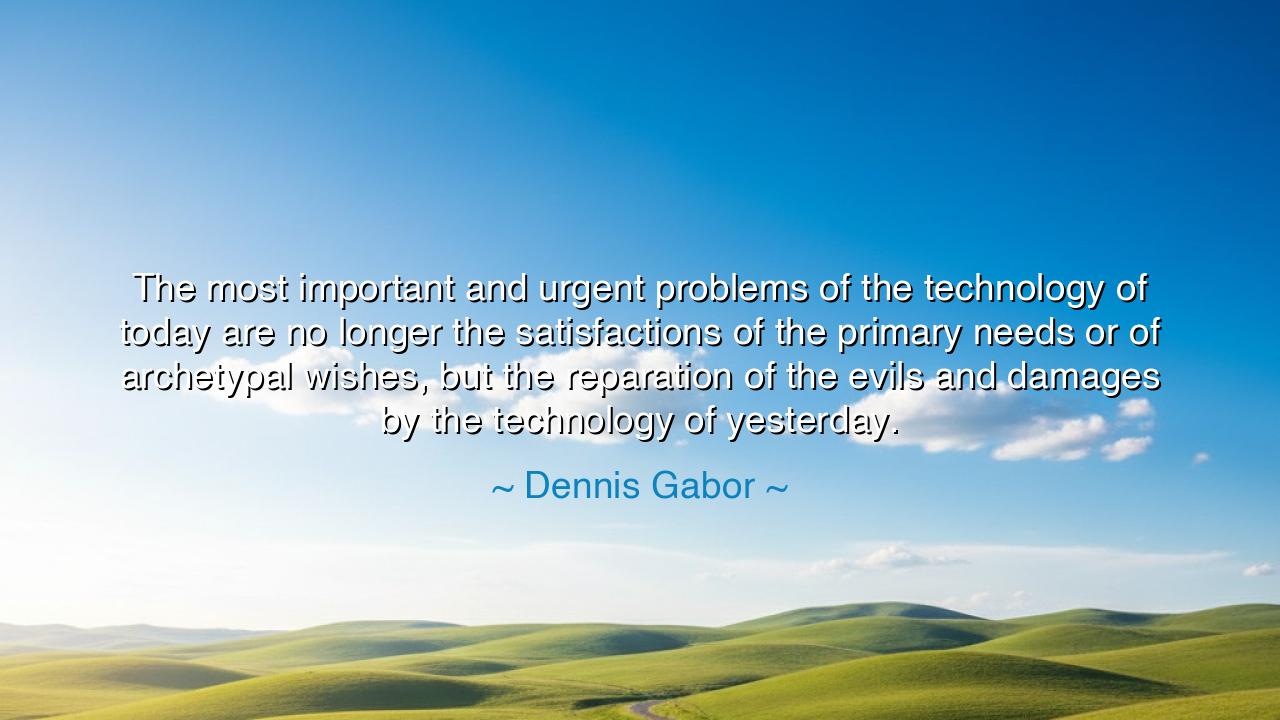
The most important and urgent problems of the technology of
The most important and urgent problems of the technology of today are no longer the satisfactions of the primary needs or of archetypal wishes, but the reparation of the evils and damages by the technology of yesterday.






When Dennis Gabor, father of holography and visionary of science, declared, “The most important and urgent problems of the technology of today are no longer the satisfactions of the primary needs or of archetypal wishes, but the reparation of the evils and damages by the technology of yesterday,” he spoke with the weight of a prophet who had seen both the glory and the ruin that human ingenuity can bring. His words are not bitter, but solemn—an acknowledgment that the marvels of invention are not free from consequence. Technology, once created to serve man’s hunger and his dreams, now demands that we heal the wounds it has left upon the world.
In the beginning, mankind bent his will toward primary needs: food, shelter, warmth, and the conquest of darkness. Fire was tamed to cook the hunt; the plow broke the soil to feed the village; the wheel carried goods and families across the land. Later, the archetypal wishes of humanity called forth music, art, flight, and even voyages beyond the stars. But Gabor’s lament reminds us that the story has changed. Today, the forge of invention is not only for creation but for correction, not only for satisfying desire but for repairing damage wrought by the very hands that once celebrated their triumphs.
We need only look to the fields poisoned by pesticides, the skies darkened by smoke, the oceans choked with plastic. These are not curses from heaven, but the bitter fruits of yesterday’s technology—solutions once hailed as progress, now revealed as wounds upon the Earth. The atomic fire, born from the genius of physics, promised near-limitless energy, yet also unleashed shadows over Hiroshima and Nagasaki. The car, once the symbol of freedom, has become a legion of engines that warm the planet beyond endurance. Thus, the work of today is not simply to build anew, but to atone for what was built before.
History provides a stark lesson in this. Consider the story of the Industrial Revolution. It lifted millions from poverty, but it also filled the air with coal dust and the rivers with filth. London, in the 19th century, was cloaked in a suffocating fog of soot that sickened thousands. Only after generations of harm did society begin the long labor of cleaning its waters and clearing its skies. In this way, Gabor’s words are revealed: yesterday’s victory becomes today’s struggle.
Yet his teaching is not despair but duty. He calls us to courage, to face the evils and damages of the past with wisdom and resolve. For if yesterday’s inventions scarred the Earth, then today’s must become the balm. Renewable energy, born from wind and sun, seeks to heal the wound of coal and oil. Conservation strives to restore forests felled by careless axes. Digital tools, though they too may err, hold the power to reduce waste, spread knowledge, and unite minds toward solutions. The task is great, but it is holy—for to repair is as noble as to create.
O seekers of wisdom, do not despise the technology of yesterday, for it was the labor of your ancestors, who built with the knowledge they had. But do not be blind to its failings. You are the generation called not only to invent but to redeem. Where there is pollution, strive for cleansing. Where there is waste, seek renewal. Where there is destruction, let your work be restoration. This is the higher calling of technology in your time: to be the healer of its own wounds.
Therefore, let Gabor’s words be a law for your heart: the greatest task of our age is not only to satisfy needs, but to repair harms. Do not think only of the wonders you might create, but also of the brokenness you must mend. The practical path is this: live and invent with foresight, build with humility, and seek always to leave the Earth better than you found it. In doing so, you will not only honor the past, but safeguard the future, becoming true servants of both progress and peace.
And so, remember, children of tomorrow: yesterday’s triumph is today’s trial. Let not despair chain you, but let courage drive you. Heal the wounds left behind, and craft a future where technology no longer scars, but uplifts, nourishes, and redeems. For in this lies the true destiny of invention.






AAdministratorAdministrator
Welcome, honored guests. Please leave a comment, we will respond soon